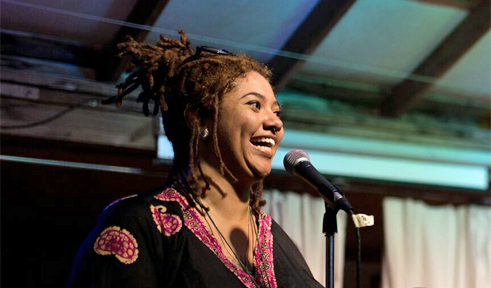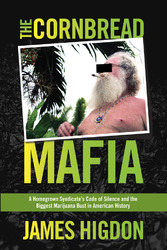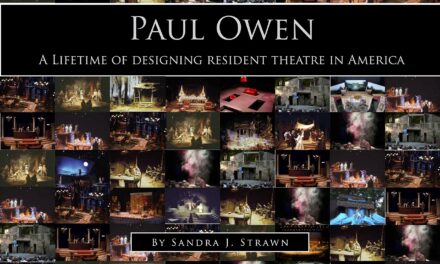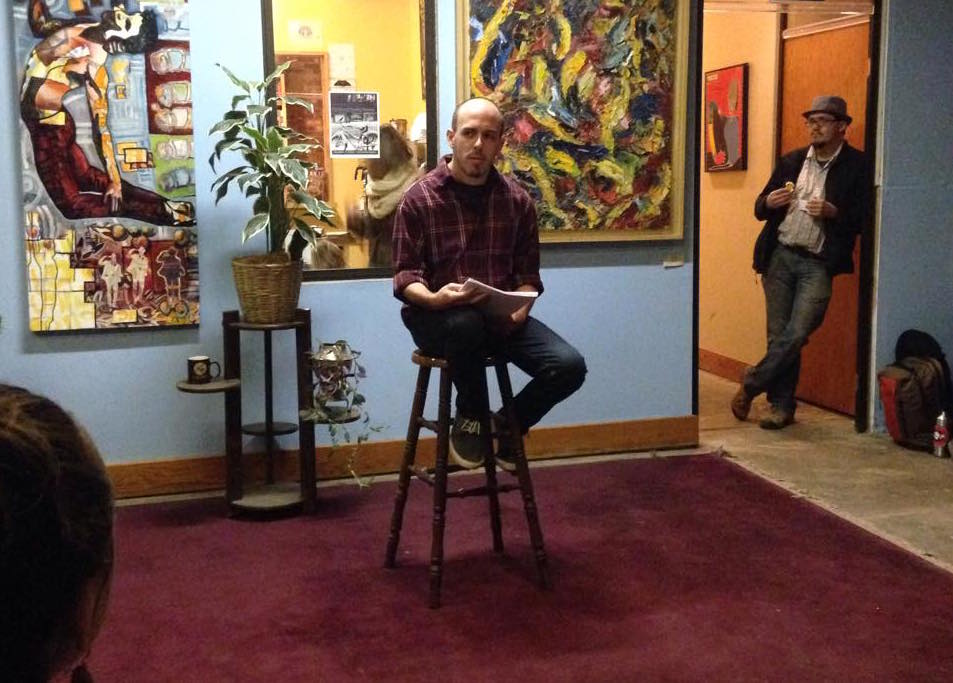Poet Bianca Lynne Spriggs. Photo:Brian Campbell
Black Bone: 25 Years of the Affrilachian Poets
Edited by Bianca Lynne Spriggs and Jeremy Paden
160 pages, Paperback and web editions
Review by Joanna Lin Want
Entire contents copyright, © 2018 by Joanna Lin Want. All rights reserved.
In Black Bone, a poetry anthology that pulls together the work of more than thirty Affrilachian Poets over a quarter century, co-editors Bianca Lynne Spriggs and Jeremy Paden have assembled a momentous cultural, historical, and artistic archive of the activist literary collective. Affrilachia, the title of poet and founding member Frank X Walker’s first poetry collection, is a term that serves to resist a racially homogeneous imagining of Appalachia and to affirm the voices of the region’s people of African descent. Spriggs and Paden note that “while it is true that the Affrilachian Poets, founded by a small group of students and professors, were born at the University of Kentucky, early on, they recognized the expansive nature of this new venture.” They continue later explaining that, “It is in the spirit of creating inclusive cultural and spiritual spaces that the founding members of the Affrilachian Poets opened up the term to include all thirteen states touched by the mountain chain that gives us our name, whether in the south or the north.” Readers will find evidence of this inclusive expansion reflected in the diversity of landscapes and cultural experiences chronicled in the collection’s poems. Black Bone presents the common project of the Affrilachian Poets as expansive in ways geographic, political, linguistic, cultural, and stylistic.
In a critical-reflective research essay included in the collection’s first section, Forrest Gray Yerman revisits the genesis of the Affrilachian Poets at the University of Kentucky (UK) and the lore associated with the collective’s formative period. Yerman’s interest is in tracing the overlapping, near mythical stories of “the elevator days,” a time in the early 1990’s when poets would go into the elevator at the UK Martin Luther King Cultural Center, hit the stop button, and read “freshly minted original poetry.” The “intimate poetry space” that Yerman describes in the Affrilachian Poets’ elevator days remains at the center of Black Bone. Kellly Norman Ellis’s poem “Affrilachian MixTape I: Turntablism” closes with the lines, “Holla if you hear/ Holla if you/ here.” And in the pages of Black Bone, readers hear an interconnected call and response across time and space among the poets themselves—poems that speak to the African American story of survival in a hostile America, to literary friendship, to the daily work of being here.
One better understands after reading Black Bone that the here of Affrilachia is not only expansive, but also complex. The voices of the Affrilachian poets sound in recognition and support of one another, but their words are also directed, piercingly at times, to readers and to a broader American culture structured to silence Black voices. One such moment is in Amanda Johnston’s poem “Answer the Call,” whose epigraph memorializes the words of Sandra Bland, an African American woman who was brutally arrested during a traffic stop and later found dead in a jail cell under suspicious circumstances. In Bland’s inaugural and now prophetic “Sandy Speaks” video, she appeals directly to her audience: “I need you. I need y’all’s help. I can’t do this by myself.” In “Answer the Call,” Johnston begins, “Can you hear it? A faint whisper at first/ trickling in from the either. A cool hush/ against your heart. Be still. Listen/ to the words flicker, I need you. You,/ not some other doer busy with the living.” Who among us is not too often a “doer busy with the living”? These words are for each of us. The poems in Black Bone will make you hit the stop button, wherever you are, and really listen.
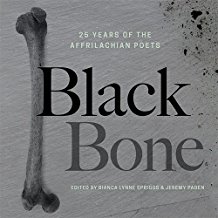 The collection, which contains retrospective and new work, pays tribute to how a literary gathering that once filled the small space of an elevator has grown beyond the borders of Kentucky to encompass the thirteen states touched by the Appalachian Mountains and become a celebrated literary activist movement across the United States. As Spriggs and Paden explain, “Affrilachia is both a geographic and a cultural space,” and their collection invites readers to experience this space by listening to its poets—listening to their stories and songs, their protests, playlists, and prayers. Many poems in Black Bone, such as Nikky Finney’s “Brown Country” and Jude McPherson’s “I Hate Crowds or Yippy Ki Yay Murica, FUCK YO COUCH!!!!” are powerfully dynamic on the page, but will make you long to hear them read aloud.
The collection, which contains retrospective and new work, pays tribute to how a literary gathering that once filled the small space of an elevator has grown beyond the borders of Kentucky to encompass the thirteen states touched by the Appalachian Mountains and become a celebrated literary activist movement across the United States. As Spriggs and Paden explain, “Affrilachia is both a geographic and a cultural space,” and their collection invites readers to experience this space by listening to its poets—listening to their stories and songs, their protests, playlists, and prayers. Many poems in Black Bone, such as Nikky Finney’s “Brown Country” and Jude McPherson’s “I Hate Crowds or Yippy Ki Yay Murica, FUCK YO COUCH!!!!” are powerfully dynamic on the page, but will make you long to hear them read aloud.
History plays an important role in this collection, and many of its poems move seamlessly through time, often to remember those who came before. “Rooted” by Shanna L. Smith is dedicated to sister forebears and recounts a woman walking along a path hewn by luminaries of African American liberation, whom the speaker intimately refers to mostly by first names: Harriet, Sojourner, Ida B., Mary Bethune, Fannie Lou and Daisy. As the poem progresses, the speaker grows increasingly aware of her indebtedness to the women who “carved out” the path before her, culminating in the poem’s final lines: “We bought you that ticket, Girl!// And they pushed.” Connected to their forebears, the poets in this collection push readers to reflect on our present moment and to take note of the uncertain history unfolding before us. In his poem “Is It Wrong?” Mitchell L.H. Douglas uses the occasion of two Jehovah’s Witnesses ringing the doorbell to critique those who would question a man’s heavenly salvation without first ensuring his earthly survival: “I can’t/ blame you,/ but if we aren’t talking/ about bullets, I don’t/ want to ponder// salvation. I don’t want/ to ignore Altons & Philandos”.
The range of voices, content, and styles in Black Bone is stunning, and the collection serves as a tributary map sure to lead readers to Affrilachian Poets’ individual bodies of work. The collection will appeal especially to Kentucky readers who want to know more about a significant branch of the state’s rich literary tradition. However, Black Bone is very much about the interconnectedness of the history, culture, and people of Appalachia to that of the United States at large, and it is an essential read even for those with no overt connection to the region.
In the collection’s final and title poem, Bianca Lynne Spriggs muses on what “Black Bone” is. Among many possibilities, she offers that it might be “What you find on a porch/ between friends in summer/ amid the moths & moonlight.” Or, “Maybe it’s what happens/ when a cacophony of tongues rise/ against so, so many bullets/ destined for Black skin.” In the end, she concludes that “Whatever it is/ it’s a mystery—”. Black Bone offers readers a chance to join Spriggs and her fellow Affrilachian Poets in pondering that mystery, to spend some time on a porch listening to friends telling us about Affrilachia, telling us about America.
Joanna Lin Want is a poet and teacher. She lives in South Bend, Indiana with her family where she teaches in the Writing Program at the University of Notre Dame. Her work has appeared in Exit 7, Crab Orchard Review, Indiana Review, Spillway and others.

